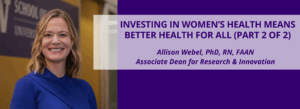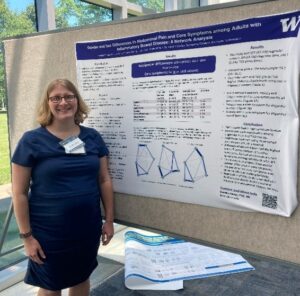
Women comprise half the U.S. population, own approximately 40% of American businesses, educate most of our nation’s children, lead 10% of Fortune 500 companies, establish a growing number of startup companies, and provide more than 75% of both paid and unpaid care to our seniors. While we clearly have a detailed understanding of women’s demographic characteristics and their significant economic contributions, we still know relatively little about their health. When most people think about women’s health, they think of pregnancy and childbirth and breast, ovarian and uterine cancers. This is understandable, because the most evident differences between women and men are these reproductive organs; yet it is also an oversimplification of the range of health issues impacting women every day.
In 2018, heart disease, Alzheimer’s disease, pulmonary disease, stroke, and lung cancer were the leading causes of death and disability among American women; yet few people outside of the healthcare industry realize just how prevalent these diseases are in women. Women’s health is not mysterious or inexplicable; rather, at best, it has been rigidly compartmentalized and at its worst, woefully ignored.
This week, we continue our Investing in Women’s Health series by profiling the work of three University of Washington School of Nursing investigators who are dedicated to examining how to prevent and mitigate often overlooked health conditions in women.

Puberty is not a topic many people enjoy thinking or talking about, but Dr. Maria Bleil has spent decades trying to demystify how and what happens to girls during puberty, and the impacts to their health over the course of their lives. Maria discovered that girls who experience earlier puberty are more likely to face certain health issues such as obesity, diabetes, heart disease, and even early death. These problems can be triggered by factors such as being overweight or having difficult experiences during childhood.
Maria leads a research team that aims to help all women, by identifying ways to support girls before they enter puberty. Focusing on targeting these prepubertal risk factors, her goal is to discover new ways to ensure a healthy pubertal transition, which will contribute to better health for women in the long run. Her work is supported by research grants from major health organizations, including four of the National Institutes of Health.
Though this is difficult work under the best of circumstances, Maria and her team are motivated by the importance of developing new knowledge that improves women’s health. Although women tend to live longer than men, they often suffer from more health problems and disabilities. She believes her research can make a difference for all women, helping them live healthier lives.
Looking ahead, Maria hopes that healthcare providers and institutions will consider puberty as a key factor when treating girls and women. By assessing early puberty signs and assisting girls who experience accelerated pubertal maturation, long-term health issues including heart disease and stroke may be prevented. Through her groundbreaking work, Maria strives to ensure that women not only live longer, but also enjoy better quality lives.

Presenting Her Research at NIH
Tackling research on neglected health conditions is hard and often thankless work, but Assistant Professor, Kendra Kamp has never been daunted by the unknown. Dr. Kamp’s program of research is focused on making gut health better for everyone, especially for people living with inflammatory bowel disease (like ulcerative colitis and Crohn’s disease) and irritable bowel irregularities. Using funding from the UW School of Nursing Research Intramural Funding Program and the National Institutes of Health, her team has discovered that symptoms like diarrhea, bloating, abdominal pain, and fatigue are worse during menstruation. They also found that women with inflammatory bowel disease go through menopause earlier than those without the disease. By studying menstrual cycles and menopause, Dr. Kamp hopes to understand how reproductive hormones, symptoms, and biomarkers interact and affect all women.
Dr. Kamp is motivated by her experiences as a wife, mother, granddaughter, and caregiver. She has seen how women’s health affects the whole community and has witnessed friends and family suffer in silence because of cultural taboos and stigmas around discussing bowel problems or vaginal pain. She and her team are working to change this and ensure all women receive compassionate, evidence-based care. Looking ahead, Dr. Kamp envisions a future “where there is a strong focus on investing in women’s health. Women no longer have to suffer in silence”.

Last, but certainly not least, Associate Professor Oleg Zaslavsky is pioneering ways to support caregivers of older adults. Dr. Oleg Zaslavsky’s research is creating and testing novel digital tools to support cognitive, emotional, and physical wellbeing in older adults, particularly women who face greater risks of emotional disturbances and caregiving burden. By combining behavioral science, user-centered design, and technology, Dr. Zaslavsky and his team aim to promote healthy aging by creating accessible, evidence-based tools that support aging well and resilience in older adults. Dr. Zaslavsky’s work has received over $2 million in funding from the National Institutes of Health and private foundations. This support helps his team develop novel, evidence-based tools that are easy to use and accessible to many people.
The breadth of work highlighted in this series covers pivotal moments across the lifespan of women. From advancing HIV and STI prevention and treatment during pregnancy, supporting early development in childhood (Drs. Oxford, Bleil) to developing technological solutions to supporting healthy aging in older adults. As the leading funder of Research & Development in the United States, the Federal government has been instrumental in the discoveries described in this series. However, continued slowdowns in NIH and other federal funding are likely to threaten future progress. Despite these challenges, the knowledge generated by our passionate investigators will significantly improve women’s health– but this knowledge must be understood within the broader social, historical, economic, community contexts of women.
With the future funding in question, the University of Washington School of Nursing remains steadfast in its commitment to advancing women’s health research. Our vision is a future where all women – across all communities – have access to high-quality healthcare. We will continue to seek out bold, mission-driven partners who will work with us to support research that enables women to live their entire lives with prosperity, independence, dignity and liberty. Our dedicated faculty, staff and students are united in their efforts to generate high-quality evidence and innovations that advance science and transform this vision into reality.
~Allison R. Webel, PhD, RN, FAAN
Associate Dean for Research & Innovation
In case you missed the first part, you can find it here.